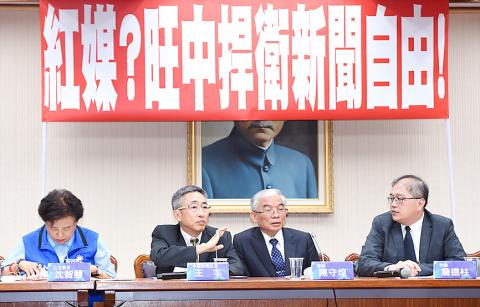Want Want China Times Media Group (旺旺中時集團) yesterday announced that it would file defamation lawsuits against the London-based Financial Times, Taiwan’s state-run Central News Agency (CNA) and all media companies that have cited a Financial Times report.
The report, written by Kathrin Hille and published on Wednesday, accused Want Want-owned media outlets the China Times and CtiTV (中天電視) of taking orders on a daily basis from China’s Taiwan Affairs Office (TAO) on how to prepare their news.
China Times president Wang Feng (王丰) made the announcement at a news conference in Taipei, which was also attended by several Chinese Nationalist Party (KMT) lawmakers.

Photo: Liao Chen-huei, Taipei Times
Wang said that CNA president Chang Jui-chang (張瑞昌) had taken the lead in spreading misinformation by running one-sided reports and analyses, adding that Chang has left an indelible stain on the national news agency by propagating “fake news.”
Wang demanded to know if Chang had over his two decades at the China Times as a reporter and deputy editor-in-chief ever received a telephone call from the TAO.
The past three days are the “darkest days for journalism in the Republic of China,” Wang said, adding that the Financial Times’ “baseless accusation” is the greatest insult to the professionalism of Want Want, which is “determined” to take Hille to court to “defend the group’s honor.”
The China Times has been labeled as “red media” simply because it supports peace across the Taiwan Street, seeks to rise above partisan politics and hopes for a better life for the average Taiwanese, Wang said.
The Democratic Progressive Party (DPP) — whose members are heirs of the spirit to fight for liberty espoused by Formosa Magazine, which on Dec. 10, 1979, organized a march to commemorate International Human Rights Day, and democracy activist Deng Nan-jung (鄭南榕), who died defending “100 percent freedom of expression” — is now the butcher of freedom and liberties, Wang said.
Freedom, democracy and human rights are hard-won values in Taiwan and journalistic freedom is the foundation of a pluralistic and democratic society, he said.
“This is the only thing Taiwan has over China,” he added.
Want Want lawyers Chen Shou-huang (陳守煌) and Chan Te-chu (詹德柱) said that the group would also sue DPP Secretary-General Luo Wen-jia (羅文嘉), who remarked in a radio interview that Want Want is funded by the Chinese Communist Party, and He Qinglian (何清漣), author of Red Infiltration: The Truth About the Global Expansion of Chinese Media (紅色滲透:中國媒體全球擴張的真相).
The group has already filed a suit against an unnamed individual for saying that restaurants in central and southern Taiwan have been paid NT$500 to display CtiTV. It also plans to sue TV Tokyo Corp for spreading the news, they said.

NO HUMAN ERROR: After the incident, the Coast Guard Administration said it would obtain uncrewed aerial vehicles and vessels to boost its detection capacity Authorities would improve border control to prevent unlawful entry into Taiwan’s waters and safeguard national security, the Mainland Affairs Council (MAC) said yesterday after a Chinese man reached the nation’s coast on an inflatable boat, saying he “defected to freedom.” The man was found on a rubber boat when he was about to set foot on Taiwan at the estuary of Houkeng River (後坑溪) near Taiping Borough (太平) in New Taipei City’s Linkou District (林口), authorities said. The Coast Guard Administration’s (CGA) northern branch said it received a report at 6:30am yesterday morning from the New Taipei City Fire Department about a

IN BEIJING’S FAVOR: A China Coast Guard spokesperson said that the Chinese maritime police would continue to carry out law enforcement activities in waters it claims The Philippines withdrew its coast guard vessel from a South China Sea shoal that has recently been at the center of tensions with Beijing. BRP Teresa Magbanua “was compelled to return to port” from Sabina Shoal (Xianbin Shoal, 仙濱暗沙) due to bad weather, depleted supplies and the need to evacuate personnel requiring medical care, the Philippine Coast Guard (PCG) spokesman Jay Tarriela said yesterday in a post on X. The Philippine vessel “will be in tiptop shape to resume her mission” after it has been resupplied and repaired, Philippine Executive Secretary Lucas Bersamin, who heads the nation’s maritime council, said

REGIONAL STABILITY: Taipei thanked the Biden administration for authorizing its 16th sale of military goods and services to uphold Taiwan’s defense and safety The US Department of State has approved the sale of US$228 million of military goods and services to Taiwan, the US Department of Defense said on Monday. The state department “made a determination approving a possible Foreign Military Sale” to the Taipei Economic and Cultural Representative Office in the US for “return, repair and reshipment of spare parts and related equipment,” the defense department’s Defense Security Cooperation Agency said in a news release. Taiwan had requested the purchase of items and services which include the “return, repair and reshipment of classified and unclassified spare parts for aircraft and related equipment; US Government

More than 500 people on Saturday marched in New York in support of Taiwan’s entry to the UN, significantly more people than previous years. The march, coinciding with the ongoing 79th session of the UN General Assembly, comes close on the heels of growing international discourse regarding the meaning of UN Resolution 2758. Resolution 2758, adopted by the UN General Assembly in 1971, recognizes the People’s Republic of China (PRC) as the “only lawful representative of China.” It resulted in the Republic of China (ROC) losing its seat at the UN to the PRC. Taiwan has since been excluded from